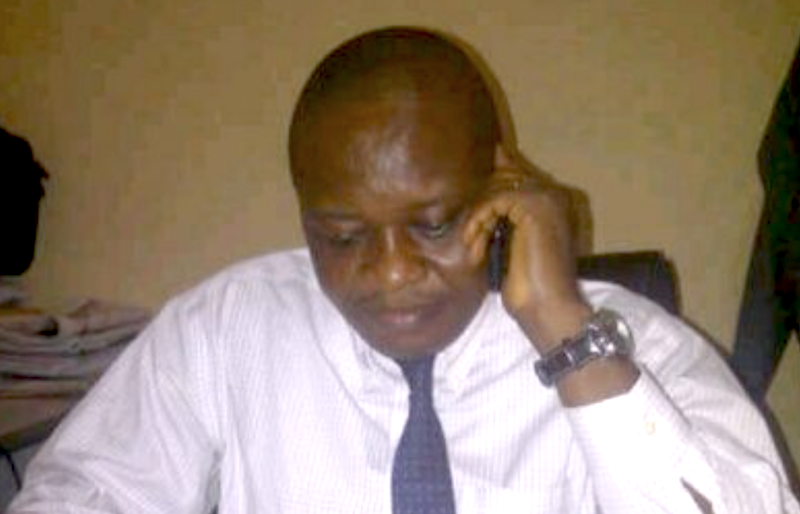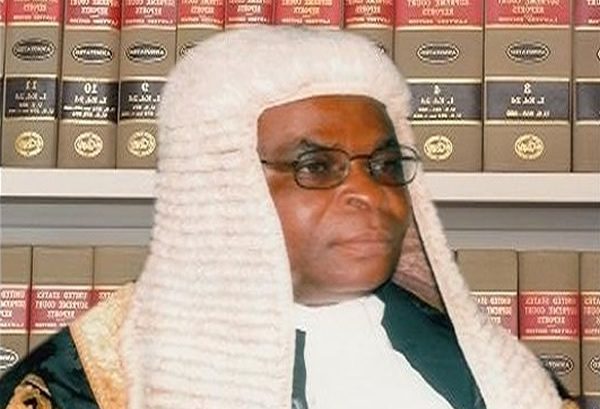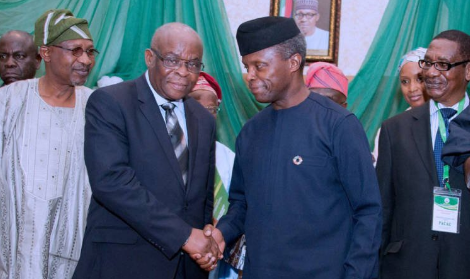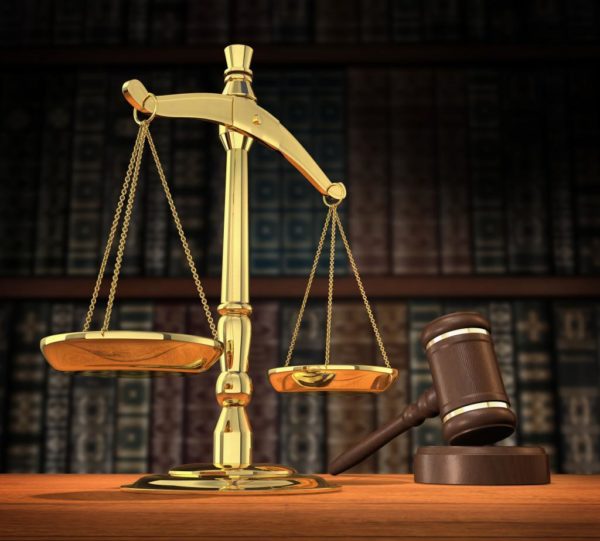Following the sack of Walter Onnoghen as Chief Justice of Nigeria , CJN in 2019 and particularly in the twilight of the first term of the outgoing administration, under circumstances that are still befuddling to the uninitiated, the judiciary stated convulsing. And it appears to have remained in the sick bay thereafter.
In his first public statement after his ouster , the immediate past CJN said the following during a book launch in 2021 : “Prior to my suspension, I was confronted with no allegation. There were rumours that I met with Atiku in Dubai. As I am talking here today, I have never met Atiku one on one in my life.
“As if that was not enough, I was also accused of setting free high-profile criminals, whereas I ceased to be a High Court Judge as far back as 1978.
“In Supreme Court, I did not sit alone. We sat in panel. In all these rumours and outright accusations, I was not given opportunity to defend myself.
“Let me make it clear that the office of the CJN was not for Onnoghen but for all Nigerians who had sworn to guide and protect the Constitution of the Federal Republic of Nigeria.
“To say the least,the period of my ordeal was the darkest era in the history of the Nigerian judiciary.”
Perhaps, as a fall out of the cold treatment meted to ex CJN Onoghen , the Supreme Court which is the apex judiciary institution in our country, appears to have been stricken by a debilitating disease that is manifesting the symptoms of cancer.
And it might as well be a cancerous infection as being suspected because that strange disease that infected the system since 2019 seem not to be responding to treatment,positively.
Instead ,the infirmity which by all intents and purposes is self inflicted,appear to have metastasized. Hence it has not only degenerated into an open revolt of fourteen (14) justices against the current Chief Justice of Nigeria,CJN , Tanko Mohammad via a petition letter written to him and leaked to the public about the deplorable welfare condition of the senior members of the Judiciary who are supposed to be crème de la crème and thus entitled to premium privileges, instead they are getting a raw deal via denial of most of the perks and appurtenances of which they are entitled.
It is not only in the dirty internal fight which has spilled into streets that the rot in the judiciary is manifesting. But the toxic state of affairs in the third arm of government has also taken a dramatic turn in the literary and common sense of the word.
While the dust was yet to settle on the blithe created by the spat between the justices in the apex court , a parody of the recent Supreme Court judgement legalizing the wearing of hijab by Muslims to school and as they deem fit, a human rights lawyer, Malcom Omoirhobo whose religious faith is African traditional worship appeared in the hallowed chambers of the apex court decked out in Oluokun worshippers attire akin to a native doctor’s costume.
It is needless stating that turning up in court in such an outlandish outfit did not only cause a stir, but it was a powerful unspoken statement against the mixing up of religion and politics which the Supreme Court has via the ruling put its imprimatur on, wittingly or unwittingly.
In justification of the protesting lawyer’s action,he made the assertion below :
“I am very grateful to the Supreme Court. Just last week Friday, they made a very resounding decision that promotes Section 38 of the constitution.That is our right to freedom of thought, conscience, and religion.
“That we are free to express our way of worship in our schools and in our courts. That decision was reached on Friday and that has encouraged me.
“Because I am a traditionalist and this is the way I worship.Based on the decision of the Supreme Court, this is how I will be dressing henceforth in court because I am a strong adherent to ‘Olokun’, the god of rivers.”
Clearly, his statement is tongue in cheek and a sort of mockery of the somewhat convoluted and jaundiced justice system that has found a foothold in our country, and he got the attention that he desired via the drama .The wise crack:action speaks louder than voice rings true here.
The embarrassing level of absurdity currently bedeviling the Supreme Court in particular and the judiciary in Nigeria, is disconcerting and unacceptable because it is the third arm in the political leadership triumvirate comprising of the executive, legislative and judiciary which is a typical feature in a democratic system of government that Nigeria is practicing.
The incumbent CJN, Tanko Muhamad has denied any wrong doing and defended himself by stating that the judiciary arm like the other two arms of government, is suffering from paucity of funds to meet the expectations of the justices,despite the N110 billion reportedly allocated to the judiciary in budget 2022.
But the offensive by the justices venting their spleen on the CJN exposes the level of decadence in the temple of justice where those who have the privilege of seating there,are supposed be in more ways than one,super humans.
That is by virtue of the fact that they seat in judgement over the rest of the members of society who are considered lesser mortals. And that being the case,they are meant to be above board and do not have the luxury of descending into the arena of less mortals by washing their dirty linens in public which the highlighted absurdities besetting the judiciary evince.
Apparently,l am not alone in worrying about the descent of the judiciary from the high pedestal where it deservedly seats to mingle with ordinary mortals in our country that have been reveling in everything vile. And it is the reason a former British prime minister, David Cameron at a cocktail on the sideline of a global anti corruption conference, with president Mohammadu Buhari of Nigeria in attendance,whispered into the ears of the Queen of England, Elizabeth ll ,that our president is the leader of a fantastically corrupt country.That is in-spite of president Buhari’s avowed intolerance for corruption.
Professor Itse Sagay, a legal luminary and lately chairman of Presidential Advisory Committee Against Corruption, PACAC , the committee on anti corruption set up by president Buhari to combat graft soon after he took over the reins of governance in 2015,in his autobiography launched on 12th May titled: All Will Be Well,dwelt on the pervading crisis of corruption that recently caused a ruckus in the judiciary to the extent that it triggered a hiatus in the top echelon of the court system, particularly concerning some Supreme Court justices who were arrested in gestapo style by men of the Directorate of State Security, DSS and arraigned largely for being in possession of huge sums of foreign currencies found in their homes.
Just before the current crisis rocking the judiciary burst into the open,I had just scanned through the aforementioned book by the respected professor Sagay who dedicated a whole chapter titled, THE JUDICIARY AND JUSTICE IN A DEVELOPING SOCIETY LIKE NIGERIA to his concerns about the sordid state of affairs in his primary constituency-the legal profession.
I was particularly drawn to the content of a topic in the book which he aptly subtitled “Corruption, Abhorrent to Judicial Culture”.
Let us hear it directly from Sagay as he espouses and articulates his thoughts in the excerpt below which has a bearing on the despicable events now wracking the judiciary.
“In a modern civilised state, members of the Legislative and Executive branches of government can afford to be corrupt without dangerously affecting the development and survival of the state, but not so, the judiciary. A modern state cannot survive large scale judicial corruption.That will bring chaos, confusion and anarchy.
He argues further that “Even during the pristine, hallowed and much lamented First Republic, major political figures were accused and tried for corruption. A Commission of Enquiry was even set up to enquire into the alleged corrupt act of a major political figure. He resigned his high political position as head (Premier) of a Regional Government,parliament was dissolved, an election followed in which his Party was returned with a bigger majority in the relevant House of Assembly and that was that.”
According to him “The point being made here is that the fabric of society was not shaken to its foundations amidst the political fervor, excitement and disagreement that followed this and other less earth-shaking developments. Why? Because the judiciary was intact, above the frenzy, noble, detached, unruffled, neutral, the epitome of integrity, nobility and honour.”
He then backed up his assertions above with land mark cases in the annals of Nigerian jurisprudence which l could not resist sharing here.
“As Justice Nnaemeka-Agu declared in Ezekiel Hart v. Ezekiel Hart20, the judiciary is the ultimate guarantor of state stability. They are the third arm of government considered by the makers of constitutions as also the third in importance. But is that true? Justice Kayode Eso, delivered a Convocation Lecture at the University of Benin on 31st January 1985, in which he claimed that the Judiciary was not only only the most important arm of government but was also in fact the grundnorm of the country. This assertion was met with some credulity and skepticism at that time. But with the passage of time and with hindsight,I have increasingly appreciated the point being made by the late legal colossus.
Consider these facts:
(i) The judiciary is the official oversight institution of the other two arms of government.
(ii) Whenever there is a dispute between any of the other two arms of government, the judiciary precides and decides which of them is right or wrong. This applies to disputes between the federal government and any state, between states themselves, between governments (federal and state) and individuals, both corporate and natural.
(iii) The judiciary can uphold the validity of any action or law or invalidate it with an order nullity.
(iv) It is the judiciary that decides what is law and what is not law.
(v) To my knowledge, the judiciary has once been asked to determine the sex of a party in a case before it. In Corbett v. Corbett [1971] p. 83, the petitioner was born a man but had undergone sex change operation to become a woman.
Thereafter, she lived as a woman, worked successfully as a female model and was recognised as a female for passport and insurance purposes. She got married to a man, and later petitioned for the dissolution of her marriage. It was argued that since it was not a marriage between a man and a woman, it was void and should simply be annulled not dissolved. The judge had to decide whether to nullify the marriage as a void marriage or dissolve it as a valid one. This was before same sex marriages were allowed. It was held that the marriage was void because the petitioner was still biologically male by gonadal, genital and chromosomal tests. Therefore the petitioner remained a male person.
(vi) It is only the judiciary that can order that life be taken by condemning a person to death.”
As a man who does not take prisoners , as such unafraid to call a spade what it is , professor Sagay unabashedly reminds readers of the elevated position of judges and courts in society.
“The organisation and arrangement of a courtroom tells it all. The judge seats on a high-backed chair on a raised platform, high above the rest of the Court. Lawyers, clients, court officers – all look up at this embodiment of authority high above them.
A judge is the indisputed master of his or her court. There is no pretense at democracy in any judicial proceedings. The lawyers apply, pray, urge, move and submit. The judge rules and decides in every case.”
Not done with sharing his candid view about judges, courts and the rest of society, professor Sagay quipped.
“Only one word strikes me when I enter the courtroom setting either as counsel or litigant – AWE! That is what the position of a judge is supposed to be – awe inspiring.
And it is not empty awesomeness. The judge is equipped with power to assert his authority by sending anyone to prison, lawyers included. We are meant to respect judges and view their office as sacrosanct because they represent the source of society’s ultimate stability and as we also say they represent the last hope of the common man.”
Lamenting the decadence currently wracking judiciary, the professor of law and octogenarian, who recently clocked 80 years of age , that has been both a teacher and practitioner of law, traveled down memory lane to recall the exploits of awe inspiring judges “Their power and authority arises, not from the Constitution or any law, but from their honour, integrity, detachment, the mystery surrounding a masquerade.
The ultimate weapon of a judge is his high moral authority, more potent than any statutory power. This is the weapon wielded by our judges even as late as 1999. The advent of the fourth Republic has come with its own culture of debasement of our judiciary.
When we look at the list of judges who graced our judicial benches in the First and Second Republics, we wonder whether they were colossuses from a distant world. Let me mention some names:
Louis Mbanefo, J.I.C. Taylor, Adetokunbo Ademola, Dadi Onyeama, Baptist Coker, Udo Udoma. They ruled the waves of the judex. It was the era of when they spoke; it was done.
After celebrating iconic legal luminaries of yore in the referenced topic in his revetting book,the very erudite legal authority continued in his treatise with his exaltation of fellow high legal minds by expounding his views in a manner that could be mistaken for pontification: “Even the second generation of Nigerian judges exercised this unquestioned authority and power. This groups includes Kayode Eso, Muhammed Bello, Chike Idigbe, Adetunji Adefarasin, Mason Begho, Andrews Otutu Obaseki, Michael Ajegbo, Chuba Ikpeazu, Anthony Anyiagolu, Chukwudifu Oputa, Atanda Fatayi-Williams, Chukwunweike Idigbe, Augustine Nnamani, Adolphus Karibi-Whyte, Philip Nnaemeka-Agu, Umaru Kalgo, Michael Oguntade, Pius Aderemi and such great names as those.”
The learned professor Sagay then posed a poignant question “Could any renegade lawyer have had the temerity to carry a bag of dollars into the chambers of these men? Certainly not!
Why, how and when did some of our judges so lower their guards that some miscreants in the legal profession have been able to approach them to tempt them into committing the original sin of their order?”
While not relenting in his admonition of current members of the judiciary,the learned silk reminded them that “When a judge,who should be next to God in our hierarchy of authority, sanctity and awesomeness, accepts a bribe,the masquerade is disrobed,the myth is demystified; the small god steps down from his temple and joins the rest of us, rolling and roiling in the mud. The sanctity is lost, the aura is gone and they become subjected to the travails and humiliation suffered by ordinary men, as we saw on the night of November 20, 2016.”
And he did not end without pointing out that “A god who descends from Mount Olympus to frolic with ordinary men should not be shocked if he is treated like an ordinary man. But this is a national tragedy that we should avoid at all costs.
Some have said, after all judges are Nigerians and we should not expect judges to be different from the rest of society. That is blasphemy! They are different from the rest of society. Judges must not abandon their high pedestal to come and dwell with the rest of society. They are judges. They judge the rest of us. Society is doomed if judges behave like the rest of us. We would have reverted to the state of nature.”
To underscore the exalted position of judges in society which professor Sagay argues is next to God, he referenced the holy Bible and buttressed his argument thus: “Of all the administrative inventions of man, the emergence of judges is the highest evidence of civilisation and the ascent of man. That is why in the bible, Moses the greatest prophet of the Old Testament was also the Chief Justice of the Israelites. He appointed more junior judges to man courts and tens and hundreds of litigants and sat at the final court of appeal over these cases”
Continuing with his indignation which antagonists can characterize as being sanctimonious , the very outspoken legal icon who was literally thrown out of university of Benin ostensibly for his active involvement in activism, went into historical archives of religion to exhume records that show that political leaders were also judges “You will all recall from the Book of Judges, that for a long time, the political leaders of Israel were also judges. Right up to the time of Jesus, the head of the temple was also the Chief Judge of the Jewish Society.
Although judges have since shared off their political and executive powers, they are still the last resort of peace, order and good governance in any society.”
Aside from drawing from biblical canons , Sagay’s narrative also establishes that monarchs were also judges “Coming closer to our times, the Kings of England were for centuries also judges. The Court of the Chancellor, now Chancery developed from the King’s Palace. Equity which is superior to common law developed from the Chancellor’s Court.
Wearing his anti corruption cap, of which he is the current Chairman of the Presidential Advisory Committee Against Corruption (PACAC), he did not mince words about his disdain for corrupt people.
“The public servants and politicians who conspire to bribe and corrupt our judges deserve especially, harsh punishment.The worst culprits in this sad and sorry state of affairs are the lawyers,mainly senior advocates,who shamelessly approach judges to introduce them into this demeaning and shameful culture.These senior advocates deserve the harshest punishment of all.The EFCC, ICPC and the Police must monitor and investigate the activities of lawyers who receive a share of the proceeds of crime as their fees. They should be treated as accessories after the fact, because they share in the proceeds of the crimes of politically exposed persons and once paid from that stained loot, it becomes their life’s struggle to protect and shield the primary criminals from the consequence of their crime.”
The duty to accept a brief does not exonerate a lawyer, who convinced or suspects his client’s guilt, urges him to enter a plea of “not guilty” which he the goes on to defend vigorously.
Such a lawyer would be grossly in breach of the ethics of the legal profession.”
The former Dean of the faculty of law in University of Ife, later Obafemi Awolowo university, who happen to have been a teacher to a legion of Nigerian lawyers , offered lawyers the following advise
“Where a lawyer is convinced after studying the law and the facts, that his client is guilty of the crime for which he is charged, it is his duty in such a case to ask his client to plead guilty and to set out the extenuating factors, if any, and plead for mercy for his client. Any other course of conduct is gross misconduct and breach of ethics of the profession. In the worst cases, we now have complicity of lawyers in their client’s crimes”
Although professor Sagay’s intervention is voluminous,l could not resist sharing the wisdom it contains by using it as linchpin for my intervention in the crisis of confidence unfurling in our highest temple of justice – Supreme Court.
As the saying goes: a word is enough for the wise.
Sadly, the mess threatening to wreck the judicial system in Nigeria is a reflection of the state of anomie that now reigns supreme in the entire gamut of government in Nigeria which could ultimately lead our beloved country into more perditions and ruins than it is in, already.
Does the current state of insecurity in our country not echo the days of the Vikings with its origin in the Scandinavian countries that ruled over most of Europe for centuries in a manner that promoted survival of the fittest as a doctrine ?
Although, it took a long time,after the horrific rule by the Vikings,Europe is today a model of peace,harmony and progress and beckoning to Nigeria and the rest of Africa.So all hope for a better tomorrow for Nigerians is not lost,as we await a rescuer, who would mount the presidential throne in 2023 and reset our beloved country from top to bottom as the trouble with Nigeria seem to be with the leadership, not the follower-ship.
When l drew the attention of a very senior professor of law from one of the best universities in the USA and indeed the world to the drama at the Supreme Court staged by the lawyer who attended the apex court in his native doctor regalia, here is how he responded:
“Honestly, I don’t blame the attorney despite the unsightly optics. The SCN has been dancing naked in recent times, what with the ongoing open altercations between the CJ and his fellow Justices over office money. You would have also noticed that the court has been churning out rulings that are unfounded in logic, jurisprudence or due process lately especially disputes with political coloration. Corruption has found a berth there. Sad”
Putting all together,the shenanigans and chicanery that have been suffocatingly dogging the judiciary are not without implications and future consequences.
The dimension and potential catastrophic effect of the revolt of the 14 justices and melodrama by the lawyer in the hallowed chambers of the supreme court may not be phantom-able , right now.
But the fall out that may presently be latent,could be simmering like molten magma underneath an active volcano, that is likely to erupt without warning.
So the National Assembly, NASS should take more than a passing interest in the matter as they are currently doing via the investigation being conducted on the conflict by the relevant committee.
As the lawyers would say when concluding a matter before a judge : l rest my case.
Magnus onyibe, an entrepreneur, public policy analyst ,author, development strategist, alumnus of Fletcher School of Law and Diplomacy, Tufts University, Massachusetts, USA and a former commissioner in Delta state government, sent this piece from lagos.
To continue with this conversation, pls visit www.magnum.ng




